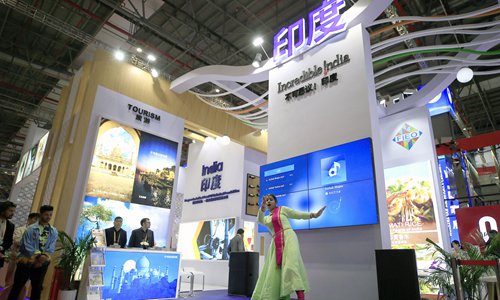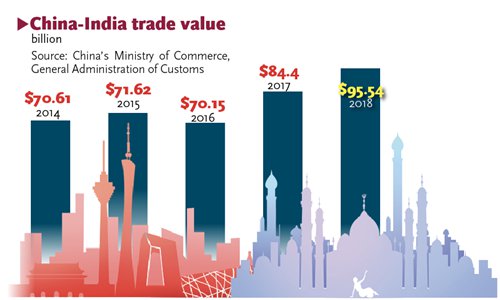HOME >> BUSINESS,SPECIAL-COVERAGE
Indian firms aim for more exports to China despite withdrawal from RCEP
By Wang Jiamei in Shanghai and Wang Yi in Beijing Source:Global Times Published: 2019/11/6 20:48:42
Companies aim for exports despite withdrawal from RCEP

A view of India's national pavilion on Tuesday during the second China International Import Expo Photo: Yang Hui/GT

Graphics: GT
Indian businesses are increasing their presence at the second China International Import Expo (CIIE), in the hope of finding opportunities emerging with China's rising consumption, while the country surprisingly pulled out from a free trade deal called the Regional Comprehensive Economic Partnership (RCEP).
Business representatives and officials from India, which joins the list of guest countries of honor at the CIIE this year, are seriously promoting their exports at the expo, especially for medical products, information technology (IT) and the agriculture sector.
"We are expecting good trade with China, more chances of exporting to China. That's why we are participating in the [CIIE] for the second time," M. Shaji, deputy director of the Marine Products Export Development Authority under India's Ministry of Commerce and Industry, told the Global Times.
China has rising demand and may import more seafood from India, especially shrimp, he said.
"The Chinese market has big potential. In 2017, our chemical exports to China increased by 144 percent; last year it was 89 percent," Ajay Kadakia, chairman of the Indian Basic Chemicals, Cosmetics and Dyes Export Promotion Council, told the Global Times.
The number of Indian companies attending the second CIIE is about 100, India's Consul General in Shanghai Anil Rai said, according to Indian news agency PTI.
"We have no business in China, but we are looking for some partners in China that can represent us, hopefully at this expo," Sudhir Chitragar, owner of The Millet Co, a food company, told the Global Times on Wednesday.
K. Jagannathan, deputy director of the Spices Board under the Indian Ministry of Commerce and Industry, who is attending the expo for the first time, told the Global Times that, "We are expecting more orders, that's why we are here."
The attitude of the Indian business community toward free trade shows that free trade pacts like the RCEP are favorable to India in the long run for their trade balance and industry development, according to experts.
India's withdrawal from the RCEP, the would-be largest free trade pact in the world, will have different influences on different industries in the short term, but in the long run, it's not conducive for the country to achieve trade balance and develop its industries, said Liu Xiaoxue, an associate research fellow at the Chinese Academy of Social Sciences' National Institute of International Strategy.
"[The decision against joining] the RCEP hurts our chemical industry," Kadakia said, noting that "RCEP is a must for the chemical industry."
"For the Indian chemical industry, its major market is in the Association of Southeast Asian Nations (ASEAN), and India's withdrawal from the RCEP will make its products lose their edge in price," Liu said.
The large trade deficit is a structural problem. India can't just expect China to solve the problem, Liu added.
The bilateral trade volume between China and India was $95.54 billion in 2018, up 13.2 percent year-on-year, data from China's Ministry of Commerce showed.
China has been India's largest trade partner for a long time, and India is China's largest trade partner in South Asia. The trade volume between the two countries already approached $100 billion in the first ten months of this year, said Sun Weidong, Chinese Ambassador to India, in an interview with the Xinhua News Agency in October.
Newspaper headline: Indian firms increase CIIE presence
Posted in: ECONOMY,LATEST NEWS